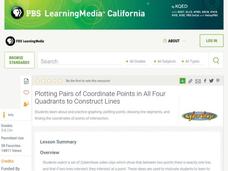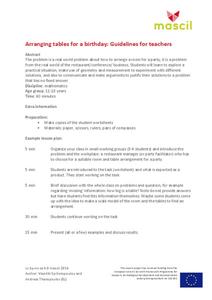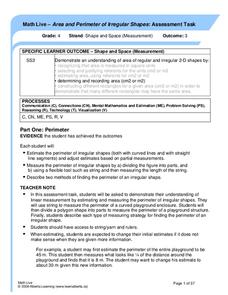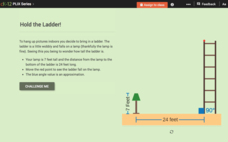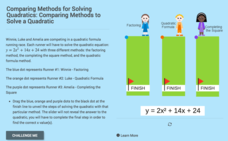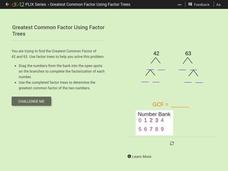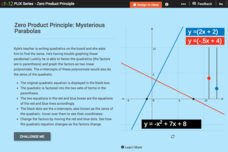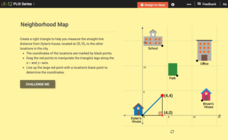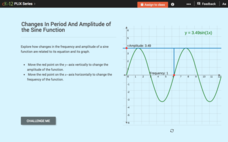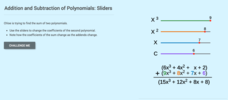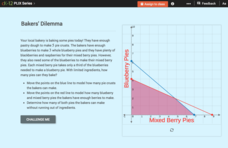PBS
Plotting Pairs of Coordinate Points in All Four Quadrants to Construct Lines
Your young graphers are motivated by watching three Cyberchase videos to plot points in all four quadrants, connect pairs of points to make a line segment, and find the point of intersection of two lines.
Mascil Project
Arranging Tables for a Birthday
Planning a party of 45 guests may be more complicated than it would seem. Learners must design the space in accordance with these constraints about the space available in the room. They need to calculate area, circumference,...
CK-12 Foundation
Input-Output Tables for Function Rules
How does changing a graph affect the function? Learners watch the changing input-output table as they adjust the location of the line graph. Questions prompt them to complete a table of values and determine the function rule.
Alberta Learning
Area and Perimeter of Irregular Shapes
Evaluate young mathematicians' understanding of area and perimeter with this series of three assessment tasks. Challenging students to not only calculate the area and perimeter of irregular shapes, but to explain in writing their...
Curated OER
Describing Data
Your learners will practice many ways of describing data using coordinate algebra in this unit written to address many Common Core State Standards. Simple examples of different ways to organize data are shared and then practice problems...
CK-12 Foundation
Quadratic Functions and Equations
The form of a quadratic function paints a picture of its graph. Young mathematicians explore this connection by locating key features on a graph and then writing the corresponding equations. The interactive tutorial highlights key...
CK-12 Foundation
Matrices to Represent Data: Houndstooth
Apply matrices to fashion. Here your classes use a matrix to create a popular clothing design. As they construct the pattern, they review the dimensions of a matrix by considering the rows and columns.
CK-12 Foundation
Logarithms: Logarithm Triangle
Study logarithmic properties using a triangle. A clever manipulative shows how a triangle can represent the three parts of a logarithmic or exponential equation. Pupils review the concept and then answer guiding questions to further...
CK-12 Foundation
Scientific Notation: Matching Numbers to Notation
Explore the conversion of numbers to scientific notation and back again. Learners begin with a matching activity to identify equivalent expressions. Then guiding questions test and extend their understanding.
CK-12 Foundation
Exponential Properties Involving Quotients
Watch as exponential expressions expand and contract! An interactive tutorial leads young mathematicians to the discovery of the quotient property of exponents. Through exploration, they realize that an x in the numerator will cancel an...
CK-12 Foundation
Secant, Cosecant, and Cotangent Functions: Hold the Ladder!
Determine the length of a falling ladder. Pupils use an interactive to find the angle a ladder makes with the floor after it falls to answer questions. The scholars use the triangle formed in the interactive to determine values of...
CK-12 Foundation
Angles of Elevation and Depression: Fly-By Calibration
Determine the distance between two trees from afar. Pupils use an interactive resource to create two right triangles using trees and a plane. They determine the horizontal legs of each triangle to find the distance between the two trees.
CK-12 Foundation
Comparing Methods for Solving Quadratics: Comparing Methods to Solve a Quadratic
Determine the quickest process for solving quadratics. Pupils compare the number of steps in the process of solving quadratics using three different methods. Scholars determine which situations lend themselves to the different solving...
CK-12 Foundation
Fraction Ordering with Lowest Common Denominators: Test Your Strength
Young mathematicians use a bell and hammer to see how high or low the puck goes. Then, they order the fractional values to demonstrate the greatest to lowest hit. Students then respond to several questions that require them to use...
CK-12 Foundation
Greatest Common Factor Using Factor Trees
Beginning with a description that sets the stage, learners are asked to break down the numbers 42 and 63 to find the greatest common denominator using factor trees. As they work through the factoring process, young mathematicians are...
CK-12 Foundation
Zero Product Principle: Mysterious Parabolas
Be a hero, not a zero! Help your classes understand how to solve quadratic equations with the zero product property using an animated simulation. Using the controls, scholars manipulate the zeros and watch as the function and its factors...
CK-12 Foundation
Sum and Difference of Cubes: Stacking Blocks
Investigate polynomial factoring patterns by finding a connection to volume. As learners build a three-dimensional solid from smaller solids, they convert the visual model to a mathematical expression. Their models represent the sum of...
CK-12 Foundation
Pythagorean Theorem to Determine Distance: Neighborhood Map
Find the distance between various locations in a neighborhood. Scholars use the interactive to find distances between locations on a map. The map is overlaid onto a grid to provide coordinates for each location, and pupils apply...
CK-12 Foundation
Changes in Period and Amplitude of the Sine Function
How does a change in amplitude or period affect the equation of a sine function? Scholars move sliders to change the frequency and period of the sine function. The interactive displays the resulting equation, and pupils determine the...
CK-12 Foundation
Addition and Subtraction of Polynomials: Sliders
Slide the coefficients to determine sums of polynomials. The interactive contains sliders to change the coefficients of an addend in a polynomial addition problem. Pupils determine the coefficients of the addend to arrive at particular...
CK-12 Foundation
Systems of Linear Equations in Three Variables: Intersecting Planes - No Solution
How many different ways can three planes intersect? The interactive provides three movable planes. Pupils manipulate the planes to determine the number of solutions possible based upon their intersections.
CK-12 Foundation
Linear Programming: Bakers' Dilemma
Place the pies in a line. Pupils create a graph of a system of linear inequalities to represent the number of pies a bakery can make. Learners analyze the vertices on the graph to determine the number of pies they can bake without...
CK-12 Foundation
Fitting Lines to Data
Scatter the TV sales over weeks. Pupils create a scatter plot to display the number of TV sales over a period of several weeks. The interactive allows class members to create two lines of best fit. Then they determine which line fits...
CK-12 Foundation
DeMoivre's Theorem and nth Roots: The nth Roots of Unity
The nth roots of unity all have a magnitude of one. Scholars use the unit circle and DeMoivre's Theorem to find the complex roots of one and discover that the complex numbers all lie on the unit circle and are equally spaced around it...
Other popular searches
- Math Art Geometry Lessons
- Math Geometry Lessons
- Esl Lessons Math Geometry
- Esol Lessons Math Geometry
- Mummy Math Geometry Lesson
- Math Geometry Lesson Plans


